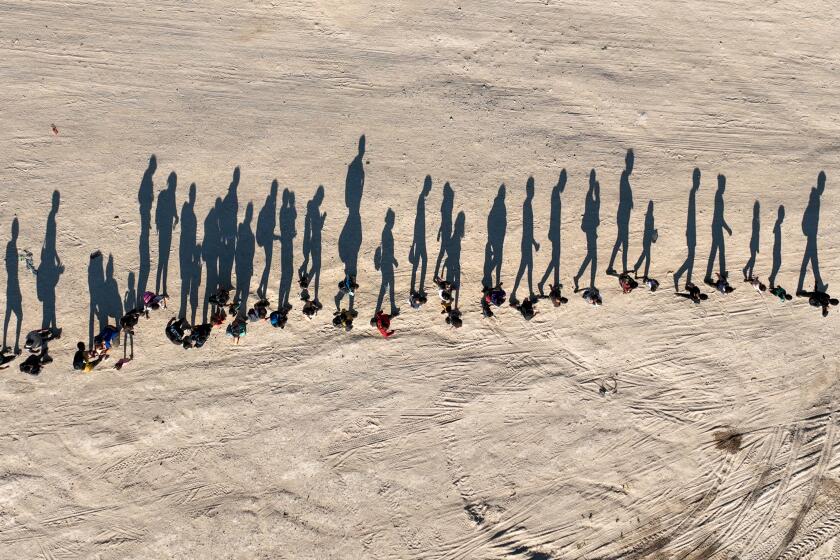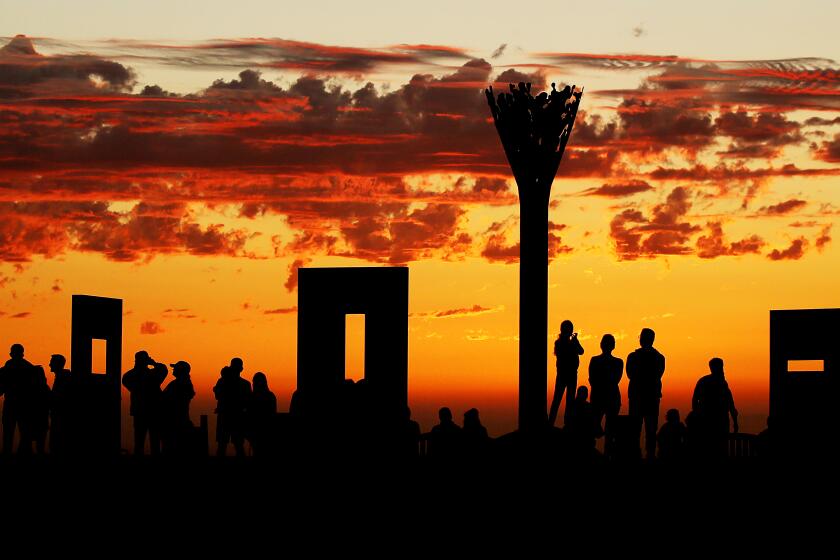Groups sue over Texas law that lets police arrest migrants suspected of entering U.S. illegally

- Share via
AUSTIN, Texas — Civil rights organizations on Tuesday filed a lawsuit challenging the constitutionality of a new Texas law that would allow police to arrest migrants who cross the border illegally and permit local judges to order them to leave the country.
The lawsuit, filed in federal court in Austin, argues that the measure that is set to take effect in March is unconstitutional because the federal government has sole authority over immigration.
The American Civil Liberties Union, its Texas branch, and the Texas Civil Rights Project sued less than 24 hours after Republican Gov. Greg Abbott signed the measure during a ceremony on the U.S.-Mexico border in Brownsville.
The civil rights groups filed the lawsuit on behalf of El Paso County and two immigrant aid groups seeking to block enforcement of the measure, known as Senate Bill 4, and declare it unlawful. “S.B. 4 creates a new state system to regulate immigration that completely bypasses and conflicts with the federal system,” the lawsuit states.
The lawsuit was filed against the head of the Texas Department of Public Safety, or DPS, whose troopers could arrest migrants, and the El Paso County district attorney, whose office would potentially prosecute cases in that border community.
Texas Gov. Greg Abbott has signed into law sweeping new powers that allow police to arrest migrants who cross the border illegally.
A DPS spokesperson declined to comment in an email Tuesday, citing the pending litigation. Abbott’s office did not return an email seeking comment and the district attorney’s office had no immediate comment.
Abbott and other Texas Republicans who support the measure say President Biden’s administration isn’t doing enough to control the border.
Soldiers and razor-sharp metal at the Mexico-Texas border don’t deter migrants who traveled months to get there, as numbers of those fleeing to the U.S. soar.
According to the lawsuit, DPS Director Steve McGraw told lawmakers that his agency estimates approximately 72,000 arrests will be made each year under the measure.
The new law allows any Texas law enforcement officer to arrest people suspected of entering the country illegally. Once in custody, they could either agree to a Texas judge’s order to leave the U.S. or be prosecuted on misdemeanor charges of illegal entry. Those who don’t leave could face arrest again under more serious felony charges.
Opponents have called the measure the most dramatic attempt by a state to police immigration since a 2010 Arizona law — denounced by critics as the “Show Me Your Papers” bill — that was largely struck down by the U.S. Supreme Court. The Texas lawsuit cites the 2012 Supreme Court decision on the Arizona law, which stated the federal government has exclusive power over immigration.
“The bill overrides bedrock constitutional principles and flouts federal immigration law while harming Texans, in particular Brown and Black communities,” Adriana Piñon, legal director of the ACLU of Texas, said in a statement.
Earlier Tuesday, ACLU affiliates in Oklahoma, New Mexico, Arkansas, Louisiana, Arizona, Texas, and San Diego and Imperial Counties in California issued a travel advisory warning of a possible threat to travelers’ civil and constitutional rights violations when passing through Texas.
Other steps Texas has taken as part of Abbott’s border security efforts have included busing more than 65,000 migrants to cities across America since August 2022 and installing razor wire along the banks of the Rio Grande.
Average Texans and Californians agree a lot more than their states’ policies would suggest, even on issues like abortion and guns. Each tips slightly in one direction, but politics magnify the differences.
More to Read
Sign up for Essential California
The most important California stories and recommendations in your inbox every morning.
You may occasionally receive promotional content from the Los Angeles Times.
















